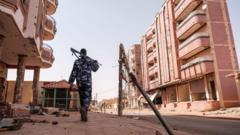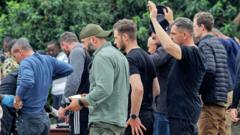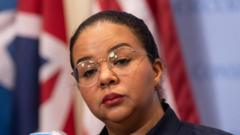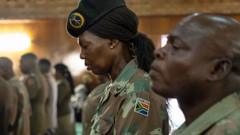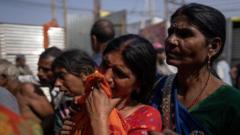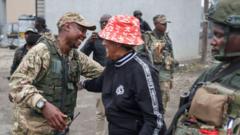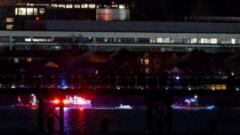The UN has confirmed more than 700 fatalities in intense clashes that erupted in Goma, the largest city in eastern DR Congo, following the M23 rebels' seizure of the city. UN spokesman Stéphane Dujarric reported that the conflict has resulted in approximately 2,800 injuries as the rebels, alleged to have Rwanda's backing, push onward toward Bukavu, the capital of South Kivu. Goma, currently under M23 control, has seen a rapid escalation of fighting, reviving long-standing tensions dating back to the 1990s. The M23 rebels, comprised mainly of ethnic Tutsis, claim their actions are motivated by the defense of minority rights, while the Congolese government accuses them of aiming to exploit the region's rich mineral resources.
Escalating Violence in DR Congo Claims Over 700 Lives Amid M23 Rebel Advances
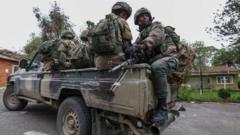
Escalating Violence in DR Congo Claims Over 700 Lives Amid M23 Rebel Advances
In a devastating resurgence of violence, the United Nations reports that heavy fighting in the Eastern Democratic Republic of Congo has resulted in over 700 deaths since Sunday, with the M23 rebels making aggressive advances.
Dujarric provided alarming updates on the casualty figures, which stem from assessments carried out by the World Health Organization in conjunction with the Congolese government. He cautioned that the numbers might continue to rise as the situation deteriorates. To counter the M23's advances, Congolese forces have erected a defensive line along the route between Goma and Bukavu, actively enlisting hundreds of civilian volunteers determined to protect their homeland. One local volunteer articulated, "I am ready to die for my country."
The governor of South Kivu, Jean-Jacques Purusi Sadiki, stated that government forces and their allies are currently staving off the rebels, though independent verification of this claim remains absent. The M23 has pledged to maintain its offensive, declaring intentions to reach the capital, Kinshasa, situated approximately 2,600 kilometers to the west. Thérèse Kayikwamba Wagner, DR Congo’s foreign minister, accused Rwanda of occupying her country illegally and attempting to orchestrate a regime change. Rwanda's government, represented by spokeswoman Yolande Makolo, refuted these claims, asserting that their troops were merely present to prevent conflict spillover.
UN experts estimate that between 3,000 to 4,000 Rwandan troops are assisting the M23 in eastern DR Congo. In light of the ongoing crisis, the Southern African Development Community (Sadc) pledged unwavering support for DR Congo during a crisis summit in Zimbabwe. The bloc has dispatched peacekeeping troops from South Africa to aid in restoring stability to the volatile region.
However, these armed conflicts have intensified the humanitarian crisis, with UN World Food Programme representative Shelley Thakral alerting that residents in Goma are rapidly depleting their supplies of food, clean water, and medical resources. Thakral noted, "The supply chain has really been strangled at the moment." Since the beginning of 2025, over 400,000 individuals have been displaced, highlighting the conflict’s profound impact on the region. DR Congo, Africa's second-largest nation, shares borders with nine countries, and past conflicts during the 1990s involved multiple neighboring nations, leading to what are often termed Africa's World Wars.
The governor of South Kivu, Jean-Jacques Purusi Sadiki, stated that government forces and their allies are currently staving off the rebels, though independent verification of this claim remains absent. The M23 has pledged to maintain its offensive, declaring intentions to reach the capital, Kinshasa, situated approximately 2,600 kilometers to the west. Thérèse Kayikwamba Wagner, DR Congo’s foreign minister, accused Rwanda of occupying her country illegally and attempting to orchestrate a regime change. Rwanda's government, represented by spokeswoman Yolande Makolo, refuted these claims, asserting that their troops were merely present to prevent conflict spillover.
UN experts estimate that between 3,000 to 4,000 Rwandan troops are assisting the M23 in eastern DR Congo. In light of the ongoing crisis, the Southern African Development Community (Sadc) pledged unwavering support for DR Congo during a crisis summit in Zimbabwe. The bloc has dispatched peacekeeping troops from South Africa to aid in restoring stability to the volatile region.
However, these armed conflicts have intensified the humanitarian crisis, with UN World Food Programme representative Shelley Thakral alerting that residents in Goma are rapidly depleting their supplies of food, clean water, and medical resources. Thakral noted, "The supply chain has really been strangled at the moment." Since the beginning of 2025, over 400,000 individuals have been displaced, highlighting the conflict’s profound impact on the region. DR Congo, Africa's second-largest nation, shares borders with nine countries, and past conflicts during the 1990s involved multiple neighboring nations, leading to what are often termed Africa's World Wars.

